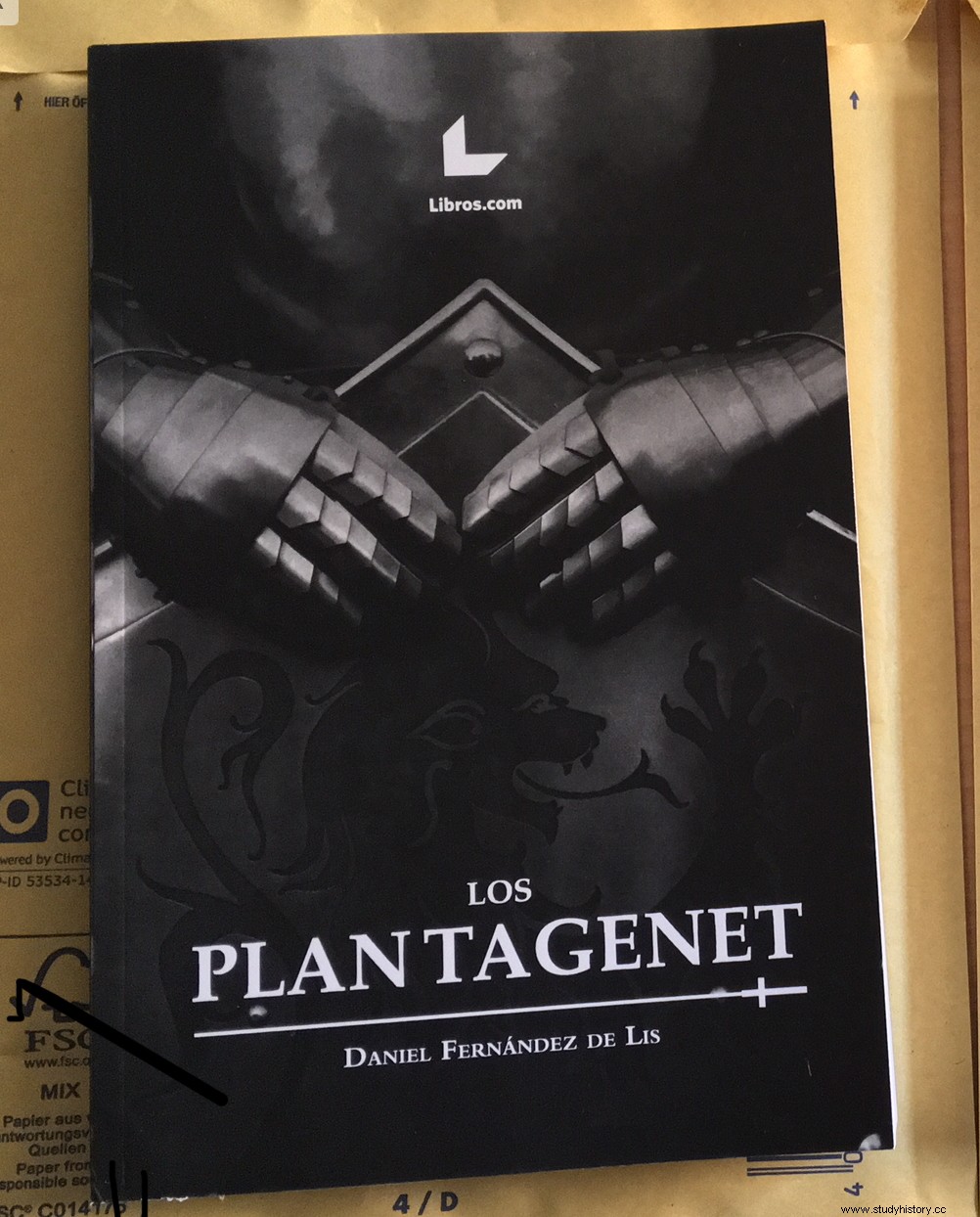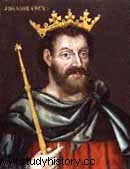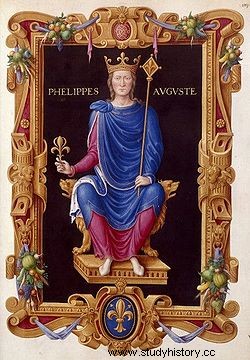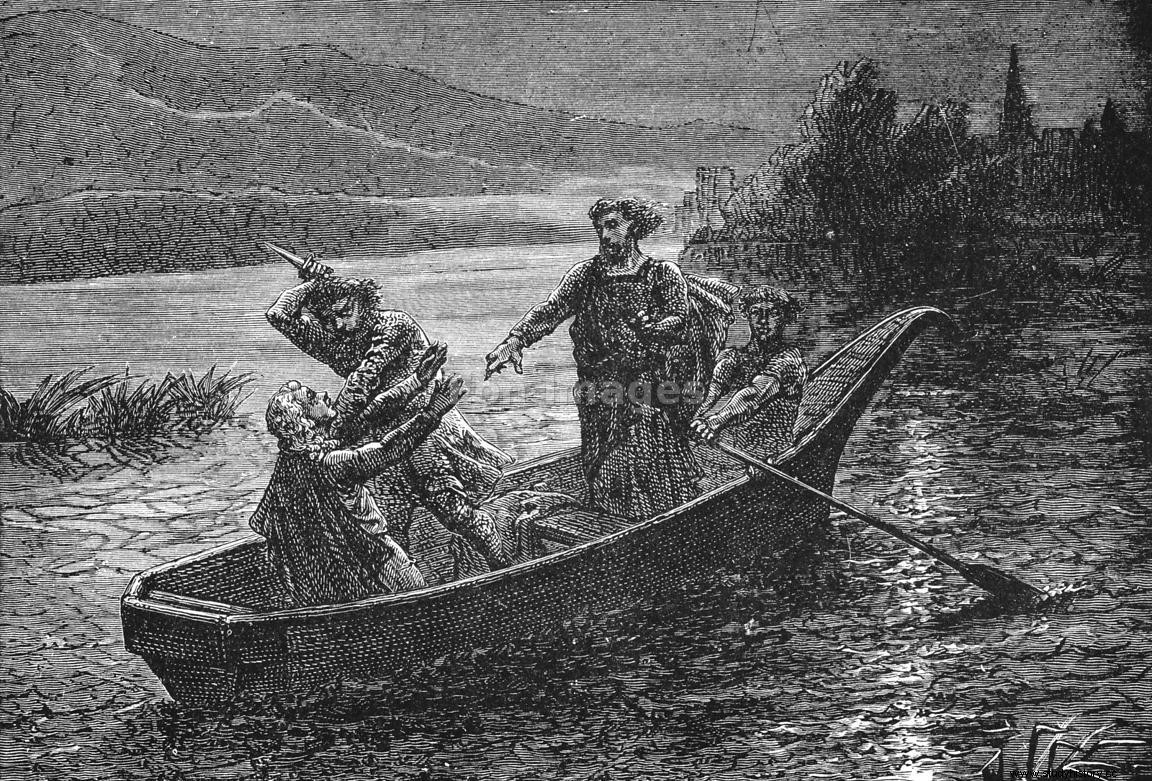 Entry taken from the book The Plantagenets
Entry taken from the book The Plantagenets
Arthur of Brittany's name may not be familiar to most blog readers. However, surely the figures of his grandparents Eleanor of Aquitaine and Henry II of England and his uncles Richard Lionheart are much better known. and Juan without Land . Precisely the latter had a lot to do, and not exactly for the better, with the brief but significant significance played by Arthur of Brittany in history. In fact, those who describe Juan sin Tierra as the worst English monarch, are based, among other facts, on what happened between Juan and his nephew Arthur.
Arthur of Brittany was born in 1187. He was the posthumous son of Godfrey of Anjou, one of the descendants of the marriage between Henry of Anjou (King of England, Duke of Normandy and of Anjou and conqueror of French Brittany) and Eleanor of Aquitaine. Still alive in 1169, Henry of Anjou decided how to distribute his domains at his death among the surviving children of his marriage to Eleanor (the eldest son William had died years before):England, Normandy and Anjou (acquired by him in turn in inheritance ) would be for his eldest son Enrique; Aquitania (acquired by his marriage to Leonor) for his second son, Ricardo, future Lionheart; Britain, which Henry had conquered in 1166, would go to his third son, Godfrey. His youngest child, Juan, was initially excluded from this inheritance; hence the nickname of Lackland (without Earth) with which he has gone down in history.
It is not the purpose of this entry to deal with the ups and downs of the reign of Henry and Richard Lionheart (see the blog posts dedicated to them). Suffice it to say that at the death of the latter, in 1199, the only surviving son of the marriage between Henry of Anjou and Eleanor of Aquitaine was the one who seemed destined not to inherit any of his parents' possessions and who would end up having them all:Juan landless.
-

- Juan sin Tierra
For Juan, however, there was a threat that could call into question his hereditary rights at the death of his brother:the son of his other older brother Godfrey, Arthur of Brittany. Juan's fear was due to two reasons.
In the first place, during Ricardo's long journey on the crusades, he had come to designate his nephew Arthur as heir, although it seems that he did so more as a measure to achieve the then three-year-old boy an advantageous marriage alliance after Richard's conquest of Cyprus and as a warning to Juan for his attempt to seize England during his brother's absence.
Second, John feared that in the event of facing a rebellion from the nobles of his domain, young Arthur might be used as the head of said movement to depose John. In this it must be recognized that he was not without reason, because when at the end of his reign Juan sin Tierra he effectively had to face an open rebellion from his nobles, they came to ask for help to take control of England from a French army led by the son of the king of France who came to invade the islands... but that's another story.
In 1196, on his return from the crusades, Richard undertook the task of recovering the possessions on the continent that had been occupied by the king of France, Philip Augustus, taking advantage of his stay on Earth Santa and his subsequent captivity. Among the places attacked was Brittany. Ricardo tried to gain custody of the young Arturo, by then already Duke of Brittany; but this had been placed by his mother and the Breton nobles in the custody of the King of France. Ricardo had no intention of naming a teenager who was under the influence of his worst enemy as heir. This fact, together with the constant efforts of his mother Eleanor of Aquitaine, was decisive for Ricardo to designate his brother Juan as heir and not his nephew Arturo.
After Richard's death in 1199, except for Brittany, Anjou, Maine, and Tourine, whose nobles swore allegiance to Arthur as their lord, Richard's remaining holdings were put (not without difficulties) from Juan sin Tierra. It was really about choosing between a lesser evil; the unpopular but adult and independent Juan or the young and inexperienced Arthur, supported by the king of France.
But Juan never forgot the threat his nephew posed, both in his continental possessions (especially due to the support of the always intriguing Philip Augustus of France) and in those on the other side of the English Channel. Arturo, for his part, might be young but he wasn't stupid and he was well advised (especially by his mother, Constanza). Already in 1199 and after signing a peace agreement with his uncle in Le Mans, he ended up suspecting John's intentions and fled the square towards Angers.
-

- Philip Augustus of France
When Arthur turned sixteen, he was knighted by Philip Augustus and betrothed to one of his daughters, in recognition of his coming of age and the willingness of him to fight for his inheritance. Philip put at their disposal a force of two hundred men and Arthur joined them at Tours, from where they tried to take Eleanor of Aquitaine prisoner, who took refuge in the castle of Mirabeau and had time to send a messenger informing John that was at Le Mans. Juan quickly came to the aid of his mother and surprised the forces of Arthur, who was taken prisoner on August 1, 1202.
Arthur was imprisoned in Falaise, while the rest of his army was distributed to other fortresses in both France and England, but not before being bound and chained and humiliated by each population which they passed. This cruel form of treatment and the lamentable state in which the prisoners found themselves created little hope for the future that awaited them at the hands of Juan sin Tierra, especially in the case of Arthur of Brittany.
At the end of the year 1202 the main nobles of Brittany and Anjou took up arms against Juan, due to his refusal to release his nephew and rumors about that he had ordered his execution. The effect they achieved was precisely the opposite. Although there is evidently no written evidence in this regard, contemporary sources suggest that Juan first ordered Arturo to be blinded and castrated in his prison; although finally said order was not carried out, it did come to Arturo's knowledge. So when, in January 1203, John moved to Falaise and offered his nephew his freedom in exchange for swearing allegiance to him, departing from Philip of France, and ordering his subjects to put an end to the revolt in Brittany, Arthur angrily refused and he claimed his hereditary rights, threatening his uncle not to give him a moment of peace. In response, John ordered that several of Arthur's followers whom he had taken prisoner be transferred to English prisons and left to starve there.
This caused the rebellion in Juan's French possessions to become widespread and was what decided Arthur's fate, as Juan decided to put an end to the rebellion by assassinating his nephew . Versions of how Arthur's death took place differ, from some suggesting that John killed him with his own hands and threw his body into a river to others that point to one of his subjects, William de Briouze or Peter de Maulay. , as responsible for the crime.
Whoever the executioner hand was, the truth is that the order to kill the young Duke of Brittany undoubtedly came from Juan landless. Killing another man on the battlefield was one thing; cold-bloodedly murdering a sixteen-year-old nephew whom he could simply have kept prisoner in his custody to avert any threat he might pose was something else entirely. In April 1203 the news was already public and notorious that Arthur had died and that the person responsible for his death was his uncle Juan de el. This fact would be used since then throughout history by the detractors of Juan sin Tierra as one of the most reprehensible of his reviled mandate.
Source|Marc Morris:King John:treachery, tirany and the road to Magna Carta.

